Subclinical hyperthyroidism is a potentially serious thyroid problem that can go undiagnosed if you aren’t looking for it.
This condition can also be confused with other medical conditions which means that not everyone with this disease should undergo treatment.
Learn more about this condition including what causes it, how it presents (symptoms), conventional treatment as well as natural treatments, and more in this guide:
What is Subclinical Hyperthyroidism?
Subclinical hyperthyroidism is a thyroid condition that is being diagnosed more and more frequently, mostly due to our enhanced ability to assess thyroid function.
Because doctors have been able to order cheap thyroid tests on many patients, the diagnosis and patterns for some thyroid diseases are being seen more and more commonly.
You may be diagnosed with this condition if you have a low-normal TSH accompanied by normal free thyroid hormones (both T3 and T4).
But, this condition is not quite as simple as looking at thyroid lab patterns, you actually need to have more information.
For instance:
While the TSH test (thyroid stimulating hormone) is an effective way to assess thyroid responsiveness to your pituitary, there are medical conditions that can artificially suppress your TSH and make your clinical picture more complicated.
Conditions such as euthyroid sick syndrome, and even some medications (such as steroids), can suppress the TSH and make it look like you have subclinical hyperthyroidism.
What complicates diagnosis, even more, is the fact that most patients who have this condition don’t have overt symptoms of hyperthyroidism, which means that this condition is usually picked up by routine testing.
This is why it’s called “subclinical” which basically means that this is a condition that doesn’t always cause symptoms.
But despite this, there is definitely something going on in your body if you have subclinical hyperthyroidism as evidenced by certain medical conditions which occur more frequently in those with this condition.
Patients who have subclinical hyperthyroidism may often start to experience early symptoms of hyperthyroidism such as early bone loss (osteopenia or osteoporosis) or heart problems (such as atrial fibrillation).
But what if you are not symptomatic?
Is it possible that some other problem is causing your suppressed TSH?
The answer is yes which is why you should be evaluated carefully before undergoing treatment for this condition.
Symptoms Checklist
Believe it or not, the consequences of subclinical hyperthyroidism are still being discovered and evaluated.
It is not well known what the impact is of this disease, long-term, on your overall health.
What we do know is that those people who suffer from subclinical hyperthyroidism tend to have an increased risk of developing
So it seems that this condition is causing problems at the metabolic level (in your cells), but these problems may not be manifested as overt symptoms (2).
It’s also important to remember that subclinical hyperthyroidism may be an early manifestation of some other cause of hyperthyroidism.
So, just because you are not symptomatic right now doesn’t mean you won’t develop symptoms in the future.
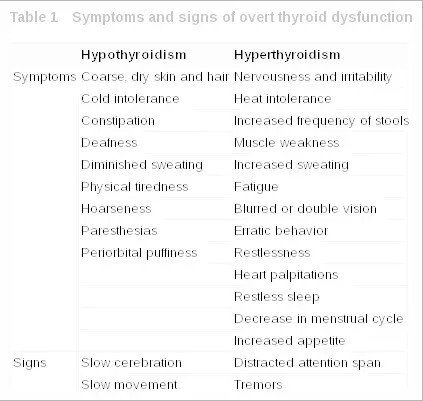
Disease exists on a spectrum, which means that early on in the course of your disease you may not experience problems until the disease reaches some critical point.
Subclinical hyperthyroidism may simply be an early manifestation of this disease and, therefore, a warning sign that something is “off” in your body.
This idea may explain why it’s hard to pinpoint specific symptoms associated with subclinical hyperthyroidism.
Those who have this condition may experience the following symptoms:
- An increased risk of early bone loss (3)
- An increased risk of cardiac (heart) problems such as atrial fibrillation (4)
- Reduction in quality of life (5)
- Increased risk of depression and anxiety (6)
- Increased risk of dementia (7)
- Increased risk of mortality (early death) (8)
With low-grade symptoms such as these, it’s easy to see why many people get diagnosed by routine testing.
You may present to your doctor with symptoms such as mild fatigue or depression, both of which can be attributed to working long hours, getting older or other conditions.
But, as was mentioned earlier, it’s important to identify the presence of this condition because it probably represents an early problem with your thyroid and your body which can potentially be treated early.
Testing (What to Expect)
Testing is one of the fastest and easiest ways to identify that you have a thyroid problem.
Basic thyroid lab tests can be ordered by your doctor and are typically covered by most insurance plans.
If you suspect that you have a problem (based on early symptoms) then checking your thyroid function is the next logical step.
You can do this by asking your doctor to order the following tests:
- TSH (Thyroid-stimulating hormone) – Thyroid-stimulating hormone is produced from your brain (pituitary gland) and gives you an idea of how responsive your thyroid gland is to stimulation by your brain. Low levels of TSH may indicate that you have excess thyroid hormone in your body and is a reflection of your body attempting to reduce further “stimulation” of your thyroid gland.
- Free T3 – Free T3 is a representation of how much active thyroid hormone is floating around in your bloodstream. High levels of free T3 in your bloodstream may indicate that your thyroid is producing too much thyroid hormone on its own.
- Free T4 – Free T4 is another thyroid hormone but not as active as T3. T4 must be converted into T3 to be active, but high levels of T4 can turn into T3 through the thyroid conversion process. High levels of free T4 may also be an early indication that your thyroid is producing too much thyroid hormone on its own.
These tests can and should be ordered on all patients being evaluated for any thyroid disease (including subclinical hyperthyroidism).
In subclinical hyperthyroidism you may find the following pattern:
- TSH – Low-normal level but not completely suppressed down to 0.0.
- Free T3 – Mid-range
- Free T4 – Mid-range
This pattern of thyroid lab test, if also accompanied by problems such as atrial fibrillation, anxiety, depression, or bone loss, may be a sign that you have an early thyroid problem or you may be at risk for developing hyperthyroidism.
Even if you have this lab pattern, you should be evaluated for other causes of low-normal TSH including conditions such as TRH-related problems, medication-induced TSH suppression (9), and recent dieting/weight loss (10).
Subclinical Hyperthyroidism vs Hyperthyroidism (Testing)
Subclinical hyperthyroidism can be differentiated from hyperthyroidism based on lab tests and also upon symptoms.
Those with overt hyperthyroidism will have lab abnormalities but also experience symptoms such as diarrhea, heart palpitations, weight loss, hot flashes, and so on.
Their lab tests may also show the following lab pattern:
- TSH – Suppressed or obviously abnormal and close to 0.0.
- Free T3 – Elevated and outside of the normal reference range.
- Free T4 – Elevated and outside of the normal reference range.
Hyperthyroidism differs from subclinical hyperthyroidism in that treatment is recommended to prevent adverse side effects from thyroid hormone on your organ tissues.
Untreated hyperthyroidism may result in serious medical conditions and potential consequences such as thyroid storm.
These two conditions are NOT the same thing, though they may exist on the same spectrum where subclinical hyperthyroidism is an early warning sign of hyperthyroidism.
What Causes this Condition?
It may come as no surprise that the same conditions which cause hyperthyroidism are responsible for subclinical hyperthyroidism.
They most likely represent an early manifestation of these diseases.
Conditions such as Graves’ disease, toxic multinodular goiter, and even the use of thyroid hormone replacement medication (11) can all result in subclinical hyperthyroidism.
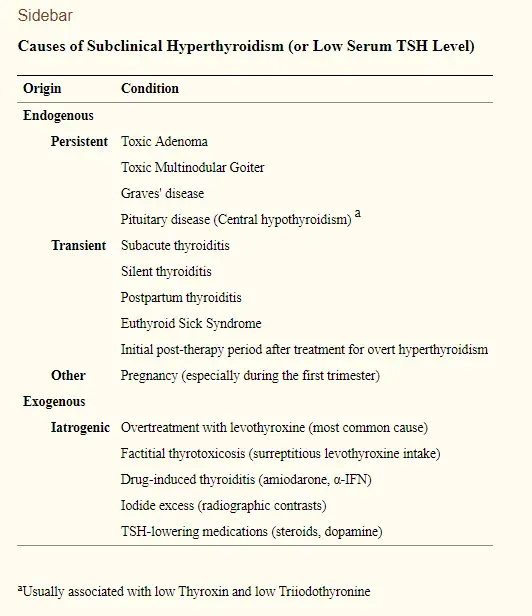
Other medical conditions which result in inflammation of the thyroid gland can also result in temporary “subclinical hyperthyroidism” lab-like results.
The group of conditions known as “thyroiditis” including postpartum thyroiditis and subacute thyroiditis, all have phases of temporary hyperthyroidism which can look very similar to subclinical hyperthyroidism.
The good news is that these thyroid conditions tend to be temporary and should fade over a few months.
So, identifying the presence of subclinical hyperthyroidism is important, but it doesn’t tell you anything about the “cause” of your condition.
You may have to do further testing and digging to figure out what is causing the issue in your body.
This can be accomplished through further lab tests, ultrasound imaging of your thyroid gland, and a comprehensive medical history taken by your doctor.
Can Thyroid Medication Cause Subclinical Hyperthyroidism?
The answer is yes!
Thyroid medication, when taken for thyroid conditions such as hypothyroidism, may cause a reduction in your TSH and may also alter your free thyroid hormones.
The goal when taking thyroid hormones (such as levothyroxine and Synthroid) is to “balance” the TSH and your free thyroid hormones to normal levels.
This sounds easy in theory but can actually be quite difficult in practice.
Each patient is different in terms of how much medication they will need, the type of medication they respond to, and how that medication will impact their thyroid lab tests.

Overusing thyroid medication can result in hyperthyroid symptoms and a lab pattern that mimics subclinical hyperthyroidism (12) (low-normal TSH with normal free T3 and free T4 levels).
In some instances, this is actually desirable and the goal of thyroid hormone replacement therapy.
An example of this is in certain cases of thyroid cancer.
Some doctors want to intentionally suppress TSH levels to prevent this hormone from “stimulating” and “growing” thyroid cancer cells in your body.
This doesn’t happen very often but it may be necessary in certain cases.
Subclinical Hyperthyroidism and Weight Gain
Is it possible to gain weight if you have a diagnosis of subclinical hyperthyroidism?
The answer, again, is yes (13).
While this isn’t a common problem among those who suffer from hyperthyroidism there are definitely a few explanations for why this may occur.
When you think about hyperthyroidism you should immediately think about weight loss, not weight gain.
Hyperthyroidism, even early conditions such as subclinical hyperthyroidism, tend to result from an INCREASE in thyroid hormone in the body.
And because thyroid hormone regulates your metabolism (14), more thyroid hormone usually results in weight loss.
Weight gain, on the other hand, is one of the hallmark symptoms of hypothyroidism which is a condition with too little thyroid hormone.
So how can someone with this condition gain weight?
Reasons you may gain weight with this condition include:
- Overuse of anti-thyroid medication – The treatment for hyperthyroidism is to block thyroid hormone production. Overusing this medication can swing you from hyperthyroidism into hypothyroidism and may cause weight gain.
- Misdiagnosis – Several conditions can result in changes in your thyroid lab tests but they don’t necessarily mean that you have hyperthyroidism.
- Medications may be lowering your TSH – Certain medications, such as steroids, can artificially suppress your TSH. These medications, if used for a long period of time, can also cause weight gain.
- Diagnosis of Thyroiditis – There are some thyroid conditions that temporarily cause subclinical hyperthyroidism but then may turn back to hypothyroidism over a short period of time. Conditions such as thyroiditis, Hashimoto’s thyroiditis, and postpartum thyroiditis all fit into this category. Just because you have a low TSH right now doesn’t mean it will stay that way. This is why you always need to constantly evaluate your thyroid lab tests.
Conventional Treatments
To treat or not to treat, that is the question.
And it is a question that many doctors wrestle with when it comes to subclinical hyperthyroidism.
Even though this condition may result in heart and bone problems, it is not known if taking antithyroid medication has any beneficial effect (15).
Because of this, it is not advisable to treat every patient with subclinical hyperthyroidism.
The “conventional” treatment for subclinical hyperthyroidism is much the same as that which is used to treat overt hyperthyroidism.
Medications such as methimazole can be used in small doses.
These medications act to block your thyroid gland from producing thyroid hormone and they also prevent the conversion of T4 to T3.
Your doctor will determine if you need treatment based on your symptoms.
For instance:
If you have osteoporosis and/or atrial fibrillation, then it may be a good idea for you to undergo treatment.
This should be compared to someone who is completely asymptomatic with no discernible problems related to their thyroid but who also has the lab features of subclinical hyperthyroidism.
The use of medications can, and should in most cases, be combined with natural therapies for best results.
Natural Treatments
Natural treatments for subclinical hyperthyroidism include basic lifestyle changes, the use of targeted supplements, and exercise.
These treatments should never be ignored and they may have a profound effect on your overall health (not just your thyroid health).
When you consider natural therapies it’s always important to find therapies that are considered “high reward and low risk”.
These therapies should not cause any harm and they have the potential of helping improve your current situation.
An example of such a therapy would be dietary changes.
It’s almost ALWAYS a good idea to improve your diet, to eat more vegetables, to reduce the amount of sugar that you consume, and so on.
It doesn’t matter what medical condition you have, this is just a good idea.
So with this in mind you can find a list of potential natural treatments to treat subclinical hyperthyroidism below:
- Dietary changes – Cut out sugar, refined carbohydrates, and processed foods, and consume more fruits and vegetables.
- Exercise routine – Make sure that you exercise daily or at least stay active.
- Supplements – Supplements such as iodine, zinc, selenium, and vitamin D can help provide your body with the necessary nutrients it needs to function. Many people in developed countries are also deficient in many of these vital nutrients.
- Stress reduction – Highly stressful situations can trigger the release of cortisol which may interfere with thyroid function. Stress can also trigger an autoimmune disease such as Graves’ disease (a cause of hyperthyroidism). Make sure that you manage your stress.
Conclusion
Subclinical hyperthyroidism is a thyroid disease found on the hyperthyroidism spectrum.
This condition is diagnosed based on certain thyroid lab tests and patterns and can be suspected in people who have early symptoms of hyperthyroidism such as bone loss or heart problems.
Even though this condition represents a complex metabolic problem for the body, it’s not well known how best to treat it.
Treatment should only be initiated in certain patients and in those whose benefits of treatment outweigh the risks.
Remember too that some conditions can temporarily result in subclinical hyperthyroidism which means you need to be diligent about the cause of your condition.
Searching for the underlying cause can help you to understand if you need to pursue treatment or if your condition will fade naturally over time.
Now I want to hear from you:
Do you have subclinical hyperthyroidism?
Are you undergoing treatment?
Is it working for you? Why or why not?
Leave your comments or questions below!


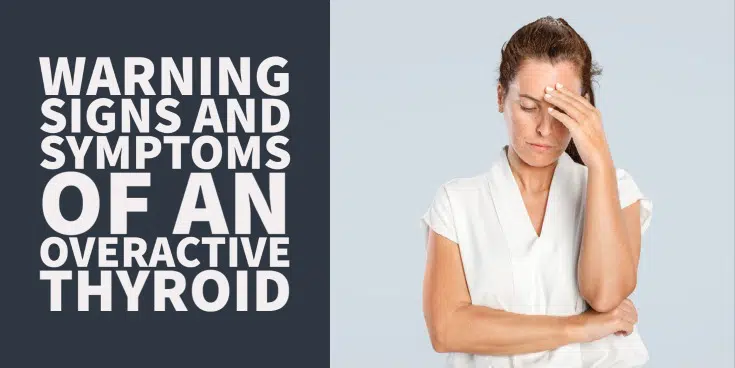
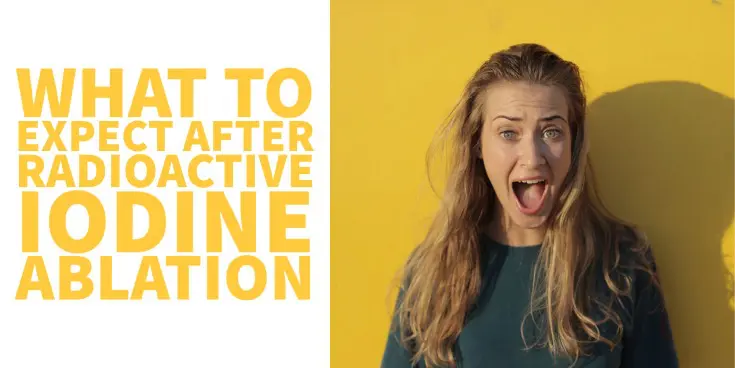
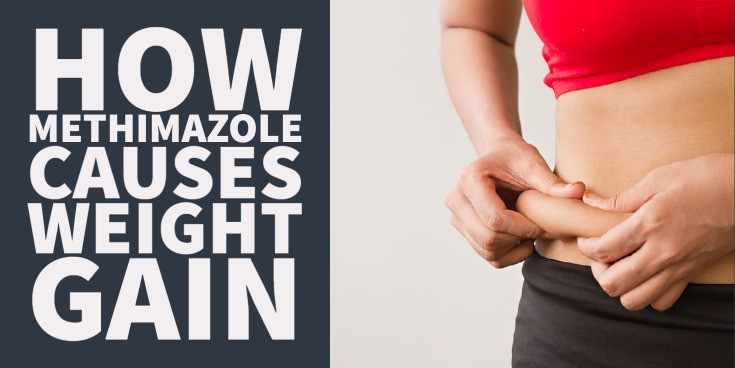
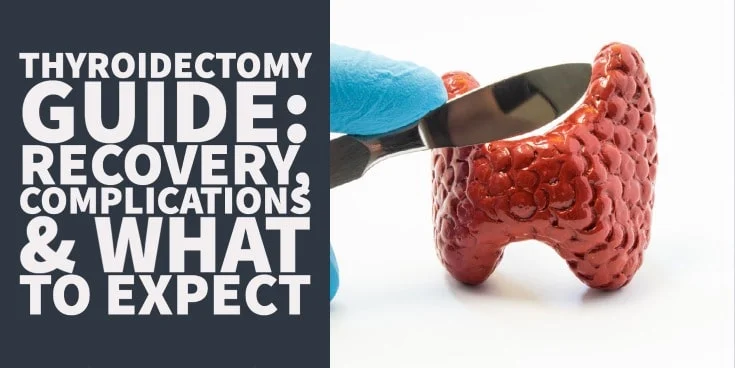
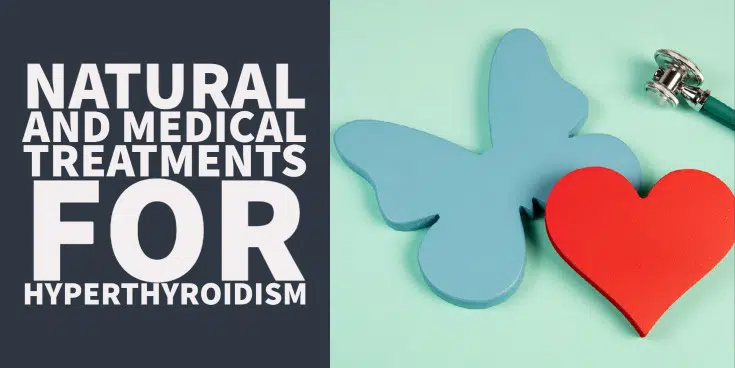


Hi Nikki,
A history of eating disorders complicates the picture significantly. If you’ve been anorexic in the past then you probably have a significant amount of metabolic damage that may take years to repair. The calorie restriction from anorexia seems to cause both metabolic and thyroid damage which may explain some of the symptoms you are now experiencing.
My daughter was hypo since she was 6, now she is 20 with Synthroid 75, she been so tired and so much mood swing for last 3-4 months, so took the test and came out subclinical hyperthyroidism. Should she decrease the dose?
Hi there,
I live in the UK and have been suffering with problematic symptoms for 5 years. I was initially diagnosed with subclinical thyroiditis and prescribed carbimozole, this made me feel even worse so after 6 weeks the treatment was stopped. My tsh levels have been up and down and are now down again to less than 0.01 with normal t3 and t4, so the next step from the gp is to start medication again. My cortisol levels have also been low although a synacthin test showed that the adrenal glands are working normally. I don’t have the normal symptoms associated with hyperthyroidism, I find it hard to lose weight and have put on weight since my first diagnosis, but I do suffer with anxiety, fatigue, strong heart beat and tremor. We don’t get a thorough bloods screening in the UK, just basic tests. What I would like to know is what to ask for, and what should I take to improve my condition? Many thanks.
Hi Doctor Childs,
For the past 7 months, my 15 year old son has consistent low tsh but normal t3 and t4 (4 blood tests over 7 month period). His thyroid antibodies and other tests relating to his Thyroid are normal. He has undergone the radioactive uptake Scan and we go back this week for the results of the thyroid ultrasound. The uptake scan did not provide a reason for the low tsh and was otherwise normal. The endocrinologist suggested an MRI of his pituitary gland. My son has symptoms of hyperthyroidism (weight loss, frequent bowel movements, fatigue). He is growing normally; 5’10 and 139 pounds. He was heavier between the ages of 11-14 but leaned out at 14 1/2 (about the time his low tsh was discovered). He takes no medications and otherwise has been healthy. I found your article interesting since there is not much information out there regarding this perplexing condition. After reading your article, I have a better understanding of what may be going on. I will encourage him to exercise daily and will also make sure he takes supplements in addition to his daily multivitamin. I think our next step may be an MRI of his pituitary gland. It appears this condition can strike at any age. I appreciate you writing this article and providing insight to those of us who are frustrated and perplexed by this condition. Your article is very helpful and reassuring to parents like me. Thank you.
I’m glad you found it helpful! You can test his TSI to get an idea if this is contributing to his current set of symptoms.
I’m subclinical hyperthyroid with multinodular toxic goiter. How’s that for a mouthful?
I’ve been dealing with this for about 2.5 years and my doctor has said I really need to take care of it. I’m scheduled for the radioactive therapy in June and absolutely dreading it. I wish I had a way out other than this. Killing off my thyroid and the myriad of things that can happen including weight gain is absolutely petrifying me.
Hi Carissa,
Sometimes RAI is unavoidable and the best option available. I always recommend a trial of other therapies before you go down that route but they don’t always work, unfortunately.
Hi, thanks for the comprehensive article on this matter. I’ve been doing a lot of research and I’m not able to find any clues to what I’m experiencing. I went from overt hyperthyroidism 2 months ago to subclinical. After about 5 weeks of 15mg Methimazole, I noticed I was feeling cold and my resting heart rate went from 80s to 60s. This seems like a hypo symptom to me but my lab tests doesn’t indicate this. I’ve been off of the drug for about 2 weeks now and have not noticed much change yet. I’m contemplating if I should start Methimazole on low dosage or seek natural solutions. Have you come across this kind of conflicting symptom?
I was diagnosed with hyperthyroidism during my second pregnancy (with twins) in 2011, my TSH was 0.01. I was put on methimazole 2.5 mg at that time. My only symptom at that time was palpitations and with treatment those stopped. After my twins were born the methimazole was stopped and labs were done. At that time my labs were normal, however my palpitations returned. It has been 7 years now that I have had palpitations, and have really been paying attention to other symptoms of hyperthyroidism. I suffer from heat intolerance, excessive sweating, irritability, fatigue, frequent bowel movements… and the list goes on. I have had numerous thyroid labs and they are all “normal”. I haven’t been able to get a doctor to listen to what I’m saying despite crying out of frustration in many different offices. My current tsh is 0.57, t4 is 1.3, t3 is 107. Does this fit subclinical hyperthyroidism?
Hi Raechel,
Not exactly but it doesn’t mean that you are on that spectrum. Minor treatment with something like a beta-blocker may be sufficient to relieve many of your symptoms.
Try a beta blocker- has helped me with heart palpitations tremendously!! Also, if you haven’t had an ultrasound of your thyroid, request one. My labs have been off for 7 years and endocrinologist did not do one. My primary doctor finally stepped in and I found out I have multinodular non toxic Nodules. Find a doctor that listens to you.
If I never become overtly hyperthyroid a concern is, just like ‘pre-diabetes’, the damage (inflammation?) is still being done. If a test and another repeat test show a pattern of subclinical hyperthyroid, and symptoms make sense to support this, yet my MD doesn’t know how to treat subclinical hyperthyroid, is there a guideline or a recommendation to share with her? Thoughts on a good place to start to prevent osteo and dementia (both of which my Mom had)? Thank you so much. I truly should see if you do consults – I keep reading articles and asking questions vs. checking out your entire web site! I’m one of the progesterone cream overuse ladies.
I have subclinical hyperthyroidism thyroid deases. How can it be treated?
Hi Joan,
I would start with the natural treatments outlined in this article.
Hi!
I have sub-clinical Hyper. T3 and T4 in normal range and my TSH has been 0.05, now up to 0.18 after 3 increases in PTU (50mg, 100mg, 150mg). I’m currently on 200 mg and get blood work this week. Its been 4 months of increasing PTU with very little change.
I have a heart murmur (which I believe began when this did). Its due to a growth.
I began PTU as I am trying to concieve. I eat healthy and exercise everyday.
How can I improve my TSH so I can conceive (it’s been 1.5 years and I’m very frustrated).
Thank you for any help
Hi Theresa,
You can use the therapies found here:
https://www.restartmed.com/graves-disease-diet/
https://www.restartmed.com/hyperthyroid-supplements/
Can you help me understand why you recommend iodine as a natural supplement? I was under the assumption that iodine was bad for hyperthyroid. Also are the recommended doses the same for children? Thanks
I mean are the recommended doses for zinc, selenium, d3, iodine, and probiotics the same for children. My son is 9, 75 pounds.
I’m wondering the same thing- I thought I should be avoiding iodine.
Dr Child,
I have had Hashimotos for nine years. Also tested positive for Epstein Bar. Which is my belief is the root cause.
This last three years I’ve made life style changes an have incorporated suppliments. As well as natural antivirals. My antibodies are dramatically dropping.
3 weeks ago I tested for sub clinical hyperthyroidism. Im confused as to what regimen of your to use?
Also at the same time I seen a Nutritionist who gave me iodine suppliments. I’ve been sick for 4 days now. I felt like I was going to die. Stopped using iodine.
Thank you, Cindy
Hello, I have subclinical hyprethyroidism with a 2cm nodule. My TSH is .01. Almost doesn’t exists. I have weight gain and would love to treat this naturally.
Thanks for any help you can provide.
Deborah N.
Hi Deborah,
Please see this 1 hour podcast on that very topic! https://www.restartmed.com/how-to-prevent-thyroid-surgery-and-radioactive-iodine-ablation-therapy-dr-osansky-and-dr-childs/
Hey Dr. Childs I just ordered your hypothyroidism bundle and am looking forward to seeing how I feel on it.
What does it mean when you experience symptons of both subclinical hyper and hypothyroidism?
I generally suffer from dry skin, easy weight gain, and extreme hoarseness (hypo) but on the other side, I noticed that when my symptoms are worse I get much more irritable, I have heat intolerance, increased sweating, restlessness, restless sleep, increased appetite, hyperactivity, AND a pounding heart that worsens at night. I can lay in my bed and count my heart rate lol
I’ve also noticed that when my hoarseness goes away, I tend to feel great. When it starts coming back, it’s only a matter of time till I start getting dry skin, sleeping poorly, etc. It’s the leading indicator for me.
What the heck does this mean? It seems to come and go in waves.
Last I checked I had low-medium TSH levels with normal T3/T4 but I’m concerned my TRT is supressing my TSH levels.
Thanks
Hi Patrick,
Have you had your thyroid antibodies tested, by chance? If not, it would be a good idea to get those evaluated. It’s not uncommon for autoimmune thyroiditis to cause fluctuating thyroid levels which may explain your symptoms.
TRT does have a suppressive effect on LH and FSH, but it won’t impact TSH levels. They are both pituitary hormones, though, which is perhaps where your confusion is coming from.
Hello! My doctor just told me I subclinical hyperthyroidism. My labs were free T4 1.09
Tsh 0.236
T3 free 2.9
I have a multinodular thyroid The right thyroid lobe measures approximately 7.4 x 2.6 x 3.1 cm in size. The left thyroid lobe measures approximately 6.9 x 2.1 x 2.5 cm in size. I’ve had a goiter for 24 years. No treatment ever. The VA say just watch it now they say I have this diagnosis. All my symptoms are similar to hypo. Even in the summer I have a personal heater at my bedside running. Along with other symptoms. I’ve tried so many natural things. I don’t know what to do now
Hi Kesha,
I would start with the natural treatments listed in this article: https://www.restartmed.com/natural-thyroid-remedies/
Hi Dr Childs, I’m 61 yr old female. Goiter most of my life, in the last 10 years thyroid nodules right lobe, and 1 on isthmus. Thyroid biopsy benign. T4, T3, Free T4, Thyroid antibodies all great, TSH on low end, subclinical hyperthyroidism. I have severe osteoporis, even though minerals, vitamins are great. I have gained weight, exhausted, poor sleep, have had irregular heat beat at times. I cannot take any type of iodine, my thyroid gets huge, can’t swallow. I do eat really well, gf, no dairy, 1 cup of organic coffee, lots of veggies lean meats, and keep gaining weight.
My endocrinologist suggested the methimazole, but I do not do well on pharmaceuticals and afraid to try it.
Any suggestions would be great.
Thank you
Hi Elle,
Your best bet is to start with lifestyle changes: https://www.restartmed.com/diet-low-carbohydrate-high-fat/
I’m pretty lost and I’m no longer sure what is right for me anymore. I’m about to be 43. My nurse practitioner told me based on my labs I’m subclinical. She recommended NP thyroid but I wasn’t sure I wanted to go on it. I’m eating 2 Brazil nuts per day. I take Vit D, Berberine, omegas, magnesium and a host of other supplements… glucosamine, tumeric. I have extreme chronic pain in my joints, I feel muscle weakness ( which no one believes), brittle hair, dry skin, inability to get lean no matter what I do. I work out 5 days a week and I have an increase in cellulite and dimpling all over my body. I seem to be swelling and expanding no matter what I do. My diet is extremely clean. I’m wired and tired, anxious, and I constantly get chest zaps around my heart, yet no one can find anything wrong! I’m chronically fatigued. Even with a good nights rest I can’t stay awake in the early afternoons, yet my cortisol is fine.
Hi Hanna,
It’s quite normal to have the symptoms of adrenal fatigue with normal cortisol, which is one of the main reasons why testing it isn’t that helpful. You can treat that condition based solely on your symptoms and you will likely see improvement.
But what you’ve described sounds more consistent with subclinical hypothyroidism, not subclinical hyperthyroidism.